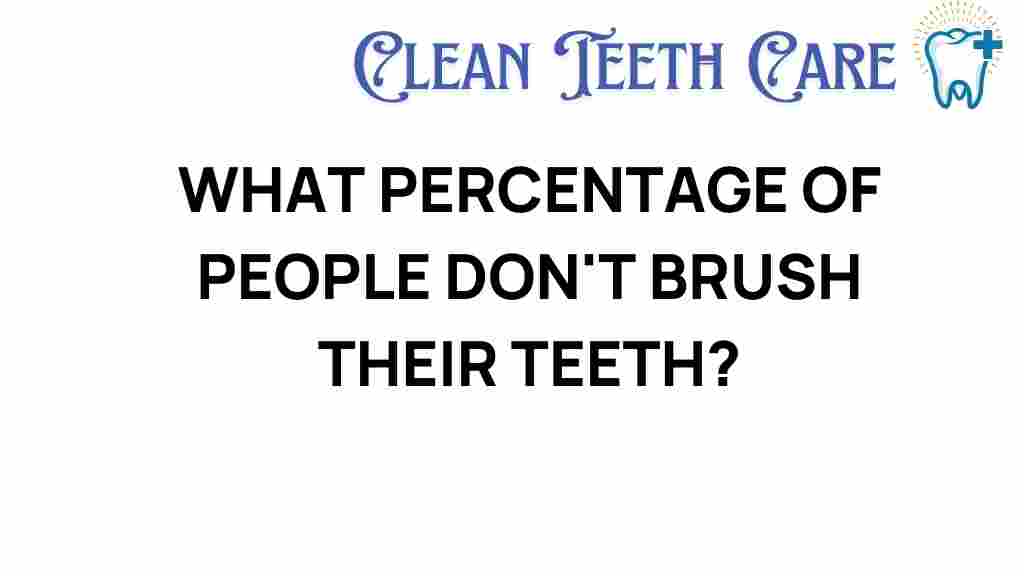The Surprising Truth: What Percentage of People Skip Brushing Their Teeth?
Maintaining proper dental hygiene is essential for overall oral health. However, a surprising number of people skip brushing their teeth regularly. This article explores the statistics surrounding brushing habits, the implications for public health, and practical tips for improving your dental care. Let’s dive into the intriguing world of hygiene awareness and discover what the data reveals about our daily routine.
Understanding the Importance of Dental Hygiene
Dental hygiene encompasses practices aimed at maintaining the health of the teeth, gums, and overall mouth. Good dental hygiene is crucial for preventing dental issues such as cavities, gum disease, and bad breath. Regular brushing is at the core of effective teeth care.
- Brushing removes plaque, a sticky film of bacteria that can lead to cavities.
- It helps prevent gum disease, which can result in tooth loss.
- Regular brushing contributes to fresher breath and a brighter smile.
Despite these benefits, many individuals fail to brush regularly. This leads us to the question: What percentage of people actually skip brushing their teeth?
Statistics on Brushing Habits
Various studies and surveys have been conducted to understand brushing habits across different demographics. Here are some startling statistics:
- According to a survey by the American Dental Association, about 23% of adults admit to skipping brushing at least once a week.
- A study published in the Journal of Dental Research found that 30% of adolescents do not brush their teeth twice a day as recommended.
- Globally, around 50% of people do not brush their teeth regularly, particularly in lower-income regions.
These statistics highlight a concerning trend in dental care, indicating that many individuals are not prioritizing their oral health as much as they should.
Factors Contributing to Poor Brushing Habits
Understanding why people skip brushing their teeth is crucial for addressing these issues effectively. Here are some common reasons:
- Lack of Time: Busy lifestyles can lead to missed brushing sessions, especially in the morning rush.
- Forgetfulness: Some individuals simply forget to incorporate brushing into their daily routine.
- Awareness: A lack of knowledge about the importance of dental hygiene can lead to poor habits.
- Access to Dental Care: In some regions, limited access to dental care and resources can affect brushing frequency.
The Impact of Skipping Brushing on Oral Health
Failing to brush regularly can have significant repercussions on an individual’s oral health. Here are some potential consequences:
- Cavities: Skipping brushing enables plaque buildup, leading to cavities and tooth decay.
- Gum Disease: Poor brushing habits can contribute to gingivitis and periodontitis, which can result in tooth loss.
- Bad Breath: Neglecting to brush can lead to persistent bad breath, which can affect social interactions.
- Overall Health Risks: Recent studies suggest a link between poor dental hygiene and systemic health issues, including heart disease and diabetes.
Improving Your Brushing Habits
Given the statistics and consequences outlined, it’s clear that improving brushing habits is essential for better dental care. Here’s a step-by-step process to enhance your hygiene awareness and ensure you’re brushing effectively:
Step 1: Establish a Routine
Integrating brushing into your daily routine is the first step towards better teeth care. Consider these tips:
- Brush twice a day—once in the morning and once before bed.
- Set reminders on your phone to prompt you to brush.
- Keep your toothbrush visible in your bathroom to serve as a reminder.
Step 2: Use the Right Tools
Choosing the right toothbrush and toothpaste can make a significant difference:
- Use a soft-bristled toothbrush to prevent gum damage.
- Select fluoride toothpaste for added protection against cavities.
- Consider an electric toothbrush, which can be more effective at removing plaque.
Step 3: Master the Technique
How you brush your teeth is just as important as when you do it:
- Brush for at least two minutes, ensuring you cover all surfaces of your teeth.
- Use gentle, circular motions to avoid damaging your gums.
- Don’t forget to brush your tongue to remove bacteria and freshen breath.
Step 4: Educate Yourself and Others
Raising hygiene awareness is crucial. Here’s how to do it:
- Share information about the importance of dental hygiene with friends and family.
- Encourage children to develop good brushing habits early on.
- Stay informed about dental health through reliable sources, such as the American Dental Association.
Troubleshooting Common Issues
Even with the best intentions, you may encounter challenges in your brushing habits. Here are some common issues and tips to address them:
- Issue: Forgetting to brush at night.
Solution: Place your toothbrush and toothpaste next to your bed as a visual reminder. - Issue: Discomfort while brushing.
Solution: Ensure you are using a soft-bristled toothbrush and not applying too much pressure. - Issue: Children resisting brushing.
Solution: Make it a fun activity with songs or rewards for consistency.
Conclusion
In conclusion, the statistics surrounding dental hygiene reveal a concerning trend: a significant percentage of people skip brushing their teeth regularly. Understanding the factors behind these habits and their impact on oral health is crucial for promoting better dental care practices. By establishing a consistent routine, using the right tools, mastering proper techniques, and raising hygiene awareness, you can improve your brushing habits and contribute to better overall health. Remember, your smile is worth the effort, so make brushing a non-negotiable part of your daily routine.
For more tips on improving your teeth care routine, check out this helpful guide on effective dental hygiene practices.
This article is in the category Hygiene and created by CleanTeethCare Team
